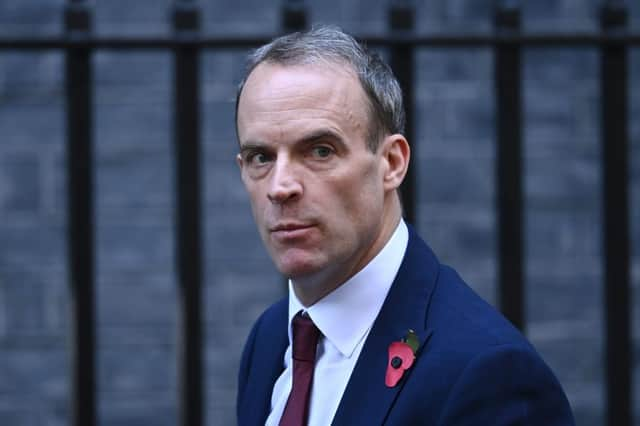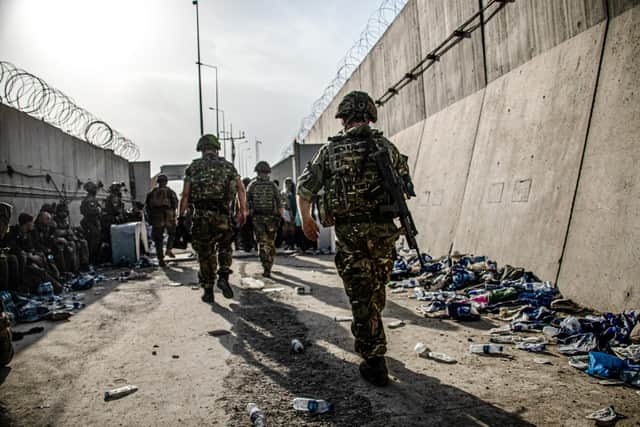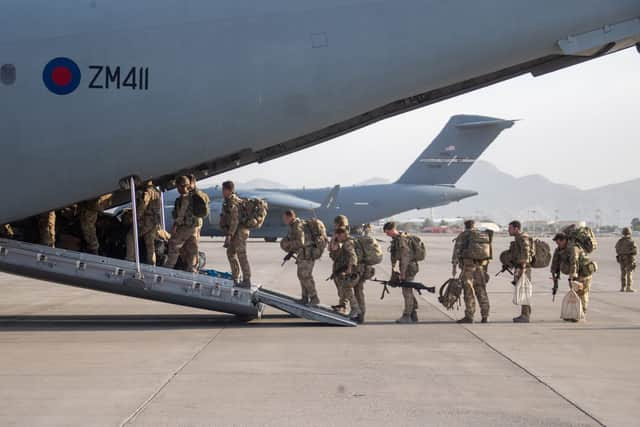Whistleblower reveals UK Government ‘failures’ over Afghanistan evacuation


A whistleblower has criticised the UK Government’s efforts to evacuate people from Afghanistan in August, claiming its failures resulted in people being murdered by the Taliban.
Raphael Marshall, who worked in the Foreign Office during the effort to get Afghan citizens out of Kabul after the Taliban took control of the country, also said Dominic Raab, who was Foreign Secretary at the time, ‘didn’t understand’ the situation.
Advertisement
Advertisement
A Government spokesperson said it had “worked tirelessly” to evacuate Afghans.
Mr Marshall made the comments in writing ahead of a Tuesday (7 December) meeting of the Foreign Affairs Select Committee of MPs as part of its ongoing inquiry into the Government’s policy on Afghanistan.
They come just a matter of months after the UK withdrew ground troops from Afghanistan and then attempted to evacuate citizens from the country.
Whistleblower reveals Foreign Office ‘chaos’
In his written evidence, Raphael Marshall has painted a picture of chaos in the Foreign Office during the UK’s Afghanistan evacuation.
Advertisement
Advertisement
A member of the Afghan Special Cases team that handled the cases of Afghans who were at risk because of their links with the UK, Mr Marshall claims multiple failures in the Government department saw just a tiny fraction of those asking for help receiving any.
He said that no member of the team working on these cases had “studied Afghanistan, worked on Afghanistan previously, or had a detailed knowledge of Afghanistan”.
Mr Marshall, who was not directly employed by the Government, alleged junior officials were “scared by being asked to make hundreds of life and death decisions about which they knew nothing”.


There was also major criticism for Dominic Raab, with Mr Marshall claiming the then Foreign Secretary “did not fully understand the situation”.
Advertisement
Advertisement
Mr Raab has rejected the account given by the whistleblower.
He was blasted at the time for not immediately returning from a holiday on the Greek island of Crete when the full extent of the crisis in Kabul had become clear.
He later said that “with hindsight” he would not have gone away at all.
In his evidence, Mr Marshall spoke of how at one point, he was the only person monitoring an inbox where pleas to the UK for help were being directed by Afghans.
Advertisement
Advertisement
He said emails were opened but not actioned, and he felt “the purpose of this system was to allow the Prime Minister and the then Foreign Secretary to inform MPs that there were no unread emails”.
“These emails were desperate and urgent. I was struck by many titles including phrases such as ‘please save my children’.”
He added: “The contrast between Her Majesty’s Government’s statements about a changed Taliban and the large number of highly credible allegations of very grave human rights abuses HMG has received by email is striking.”
Alleged chaos only saw ‘small number of Afghans’ helped
The outcome of the chaos Mr Marshall has laid out in his evidence was that only a very small percentage of Afghan citizens who asked the UK for help received any assistance, he said.
Advertisement
Advertisement
The whistleblower claimed “fewer than 5%” of people got any help from the Government.
He estimated that “between 75,000 and 150,000 people (including dependants) applied for evacuation” to the team under the leave outside the rules (LOTR) category.
“It is clear that some of those left behind have since been murdered by the Taliban,” he claimed.
The UK Government said it evacuated more than 15,000 people in the fortnight after the collapse of Kabul.


Advertisement
Advertisement
Foreign Affairs Select Committee chair Tom Tugendhat said Mr Marshall’s evidence raised “serious questions” over the Foreign Office’s leadership.
“These allegations are serious and go to the heart of the failures of leadership around the Afghan disaster, which we have seen throughout this inquiry.
“These failures betrayed our friends and allies and squandered decades of British and Nato effort.
“The evidence we’ve heard alleges dysfunction within the Foreign, Commonwealth and Development Office and substantial failings throughout the Afghanistan evacuation effort.
Advertisement
Advertisement
“The evacuation has been described as a success by some, but these allegations point to a very different story – one of lack of interest, and bureaucracy over humanity.”
Foreign Office officials are set to be quizzed by Mr Tugendhat and the other MPs on the Committee later today.
UK Government response
Responding to the allegations made by Raphael Marshall, a Government spokesperson said: “This was the biggest mission of its kind in generations and the second-largest evacuation carried out by any country. We are still working to help others leave.
“More than 1,000 FCDO staff worked to help British nationals and eligible Afghans leave during [Operation] Pitting.
Advertisement
Advertisement
The scale of the evacuation and the challenging circumstances meant decisions on prioritisation had to be made quickly to ensure we could help as many people as possible.
“Regrettably we were not able to evacuate all those we wanted to, but our commitment to them is enduring, and since the end of the operation we have helped more than 3,000 individuals leave Afghanistan.”